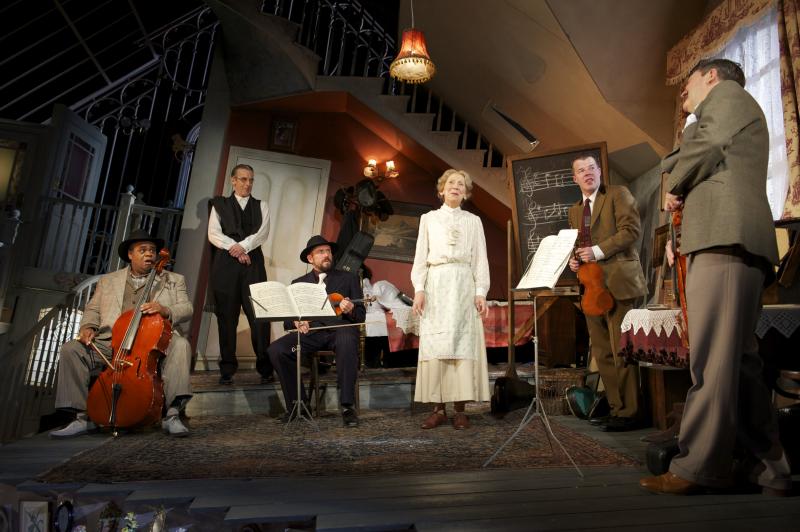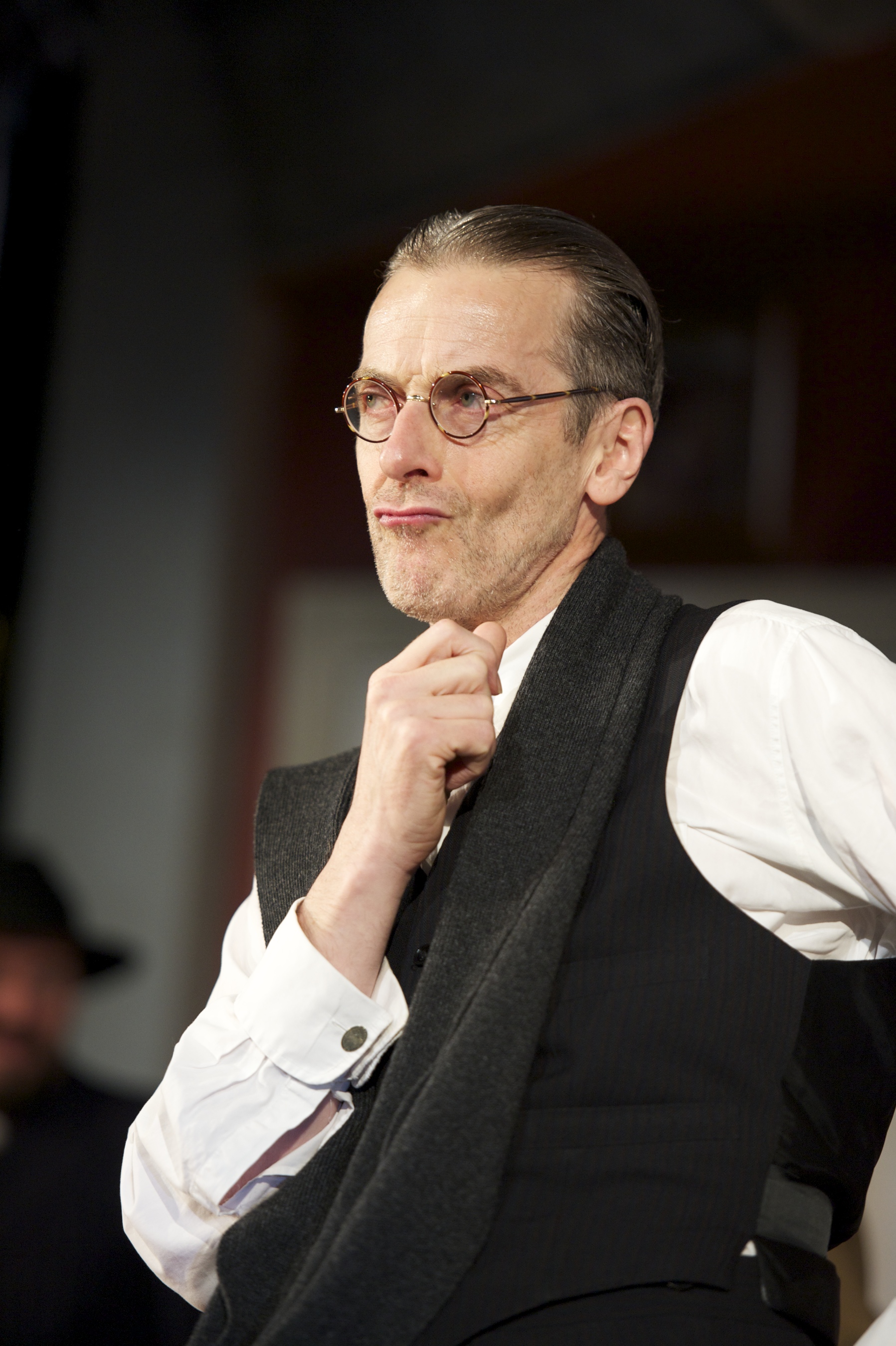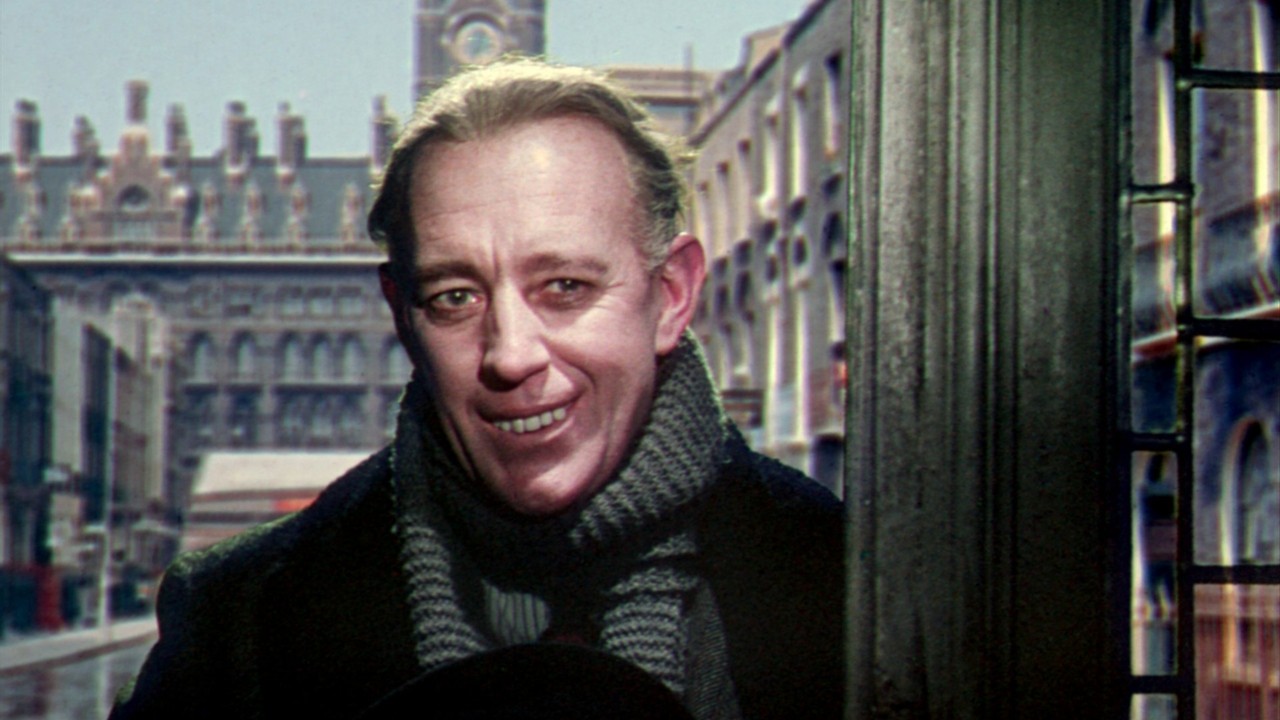The Ladykillers, Gielgud Theatre | reviews, news & interviews
The Ladykillers, Gielgud Theatre
The Ladykillers, Gielgud Theatre
Graham Linehan comprehensively revamps the much-loved 1955 Ealing comedy classic

The great Ealing film comedies are often viewed as sacred cows, no matter that a small but significant number of them were decidedly sacrilegious. Indeed, one of the studio’s last productions, Alexander Mackendrick’s The Ladykillers (1955), was also one of its cruellest. Now it has been adapted by Graham Linehan, who asserts that his aim was not to emulate Mackendrick’s jet-black satire but to translate it into farce. And that’s just what he has done, most enjoyably.
Linehan respects the film but isn’t about to be intimidated by it: “Being fooled by art is one of the primary pleasures of the middle classes," says one of his characters to barbed effect. He follows the contours of the original story (a gang of criminals posing as classical musicians enlist a sweet little old lady as their unwitting accomplice, then can’t bring themselves to bump her off) and echoes certain specific lines and scenes. Some elements, like the LOL’s cranky pet parrot, remain, cunningly adapted to the needs of the stage. But much of the play consists of entirely new material.
 Transferring from a successful run at the Liverpool Playhouse, this production, sleekly directed by Sean Foley, is fleet of foot, crammed with crisp one-liners and finely timed slapstick, and a nice and imaginative attention to detail that even manages to cram an extra gag or two into the curtain call.
Transferring from a successful run at the Liverpool Playhouse, this production, sleekly directed by Sean Foley, is fleet of foot, crammed with crisp one-liners and finely timed slapstick, and a nice and imaginative attention to detail that even manages to cram an extra gag or two into the curtain call.
Peter Capaldi (pictured right) plays Professor Marcus, the criminal mastermind. I’d half-expected to find Malcolm Tucker’s rabid belligerence from The Thick of It, but this was not to be the case. Like both Alec Guinness (pictured below left) in Mackendrick’s film and Tom Hanks (pictured below right) in the Coen brothers’ 2004 remake, Capaldi brings a slug of unctuous pretension, a creepy but not wholly dislikeable charm and a leering rictus to the character. Less extreme than his predecessors in appearance, his main affection is a theatrically overlong scarf, which inspires some neat physical business in the first half and a delectably – if predictably - nasty pay-off in the second.
 As in his previous work, such as Father Ted, Linehan applies an affectionate flair for human eccentricity to the other gang members. They have been fleshed out more fully, making the good Professor slightly less dominant: this is an ensemble piece, not a star vehicle. As the punch-drunk ex-boxer One Round, Clive Rowe – bowing out of his annual pantomime dame duties at the Hackney Empire – compensates for that absence with a grand operatic death scene.
As in his previous work, such as Father Ted, Linehan applies an affectionate flair for human eccentricity to the other gang members. They have been fleshed out more fully, making the good Professor slightly less dominant: this is an ensemble piece, not a star vehicle. As the punch-drunk ex-boxer One Round, Clive Rowe – bowing out of his annual pantomime dame duties at the Hackney Empire – compensates for that absence with a grand operatic death scene.
Both Ben Miller as an East European hard man with an unsteady command of English idiom (“Old ladies give me the penises”) and James Fleet as the stuttering Major Courtney are given some nifty verbal acrobatics and Stephen Wight’s spiv (played in the film by Peter Sellers, whose role was pruned back in the editing room) careens through the story on a deadly cocktail of uppers and downers.
Marcia Warren is a little steelier than was the radiant Katie Johnson, who created Mrs Wilberforce in 1955, but then Mrs W was, and remains, a foil for the excesses of the male characters. A bracingly camp touch is to have a couple of her twittering friends (“We have a loose society of elderly women”) played by hulking men in drag who proceed to hit on the disconcerted thugs.
 The Ealing comedies aimed consciously to project “Britain and the British character”, as a plaque on the studio proclaimed. Much analysed since, they’re still seen as state-of-the-nation films. Mackendrick – who, like his screenwriter, William Rose, was an American based in Britain - has famously stated that The Ladykillers was “a comic and ironic joke about the condition of postwar England”: a metaphor for a postwar nation locked in its imperial past.
The Ealing comedies aimed consciously to project “Britain and the British character”, as a plaque on the studio proclaimed. Much analysed since, they’re still seen as state-of-the-nation films. Mackendrick – who, like his screenwriter, William Rose, was an American based in Britain - has famously stated that The Ladykillers was “a comic and ironic joke about the condition of postwar England”: a metaphor for a postwar nation locked in its imperial past.
Though this claim is mentioned in the programme notes, the play doesn’t try for any such big broad resonances. And it’s probably wise not to do so, as the Coen brothers found in their poorly reviewed version set in the contemporary American Deep South. There’s a very brief flash of topicality in the play, in a Brechtian interchange about whether the greater crime is to rob a bank or to found one. But it’s very much a period piece.
So it’s best simply to sit back and savour the performances, script, stagecraft and sound and set design. This has to be the best theatrical house since the one in An Inspector Calls. Surmounted by Gothic tracery that evokes nearby King’s Cross Station, Mrs Wilberforce’s crooked, caved-in mansion heaves and wheezes, its lamps flickering, pipes clanking and soft furnishings fluttering all with a will of their own.
It pivots too, so that you occasionally leave the chintzy sitting room for dark moments on the roof or the facade (where model cars and a train whizz up and down to enact the bank raid). And just when you thought you had inspected its full 360 degrees, the set turns yet again to discover a railway tunnel for a small but critical scene. Like it, the play reveals new facets in an intimate landscape.
- The Ladykillers is at the Gielgud Theatre until 14 April, 2012
- Other reviews: The Guardian, Daily Telegraph, Evening Standard, Chortle
rating
Buy
Explore topics
Share this article
Add comment
The future of Arts Journalism
You can stop theartsdesk.com closing!
We urgently need financing to survive. Our fundraising drive has thus far raised £49,000 but we need to reach £100,000 or we will be forced to close. Please contribute here: https://gofund.me/c3f6033d
And if you can forward this information to anyone who might assist, we’d be grateful.

Subscribe to theartsdesk.com
Thank you for continuing to read our work on theartsdesk.com. For unlimited access to every article in its entirety, including our archive of more than 15,000 pieces, we're asking for £5 per month or £40 per year. We feel it's a very good deal, and hope you do too.
To take a subscription now simply click here.
And if you're looking for that extra gift for a friend or family member, why not treat them to a theartsdesk.com gift subscription?
more Theatre
 The Two Gentlemen of Verona, RSC, Stratford review - not quite the intended gateway drug to Shakespeare
Shakespeare trying out lots of ideas that were to bear fruit in the future
The Two Gentlemen of Verona, RSC, Stratford review - not quite the intended gateway drug to Shakespeare
Shakespeare trying out lots of ideas that were to bear fruit in the future
 Edinburgh Fringe 2025 reviews: The Fit Prince / Undersigned
A joyful gay romance and an intimate one-to-one encounter in two strong Fringe shows
Edinburgh Fringe 2025 reviews: The Fit Prince / Undersigned
A joyful gay romance and an intimate one-to-one encounter in two strong Fringe shows
 Tom at the Farm, Edinburgh Fringe 2025 review - desire and disgust
A visually stunning stage re-adaptation of a recent gay classic plunges the audience into blood and earth
Tom at the Farm, Edinburgh Fringe 2025 review - desire and disgust
A visually stunning stage re-adaptation of a recent gay classic plunges the audience into blood and earth
 Works and Days, Edinburgh International Festival 2025 review - jaw-dropping theatrical ambition
Nothing less than the history of human civilisation is the theme of FC Bergman's visually stunning show
Works and Days, Edinburgh International Festival 2025 review - jaw-dropping theatrical ambition
Nothing less than the history of human civilisation is the theme of FC Bergman's visually stunning show
 Every Brilliant Thing, @sohoplace review - return of the comedy about suicide that lifts the spirits
Lenny Henry is the ideal ringmaster for this exercise in audience participation
Every Brilliant Thing, @sohoplace review - return of the comedy about suicide that lifts the spirits
Lenny Henry is the ideal ringmaster for this exercise in audience participation
 Edinburgh Fringe 2025 reviews: The Beautiful Future is Coming / She's Behind You
A deft, epoch-straddling climate six-hander and a celebration (and take-down) of the pantomime dame at the Traverse Theatre
Edinburgh Fringe 2025 reviews: The Beautiful Future is Coming / She's Behind You
A deft, epoch-straddling climate six-hander and a celebration (and take-down) of the pantomime dame at the Traverse Theatre
 Good Night, Oscar, Barbican review - sad story of a Hollywood great's meltdown, with a dazzling turn by Sean Hayes
Oscar Levant is an ideal subject to refresh the debate about media freedom
Good Night, Oscar, Barbican review - sad story of a Hollywood great's meltdown, with a dazzling turn by Sean Hayes
Oscar Levant is an ideal subject to refresh the debate about media freedom
 Edinburgh Fringe 2025 reviews - Monstering the Rocketman by Henry Naylor / Alex Berr
Tabloid excess in the 1980s; gallows humour in reflections on life and death
Edinburgh Fringe 2025 reviews - Monstering the Rocketman by Henry Naylor / Alex Berr
Tabloid excess in the 1980s; gallows humour in reflections on life and death
 Edinburgh Fringe 2025 reviews: Lost Lear / Consumed
Twists in the tail bring revelations in two fine shows at the Traverse Theatre
Edinburgh Fringe 2025 reviews: Lost Lear / Consumed
Twists in the tail bring revelations in two fine shows at the Traverse Theatre
 Make It Happen, Edinburgh International Festival 2025 review - tutting at naughtiness
James Graham's dazzling comedy-drama on the rise and fall of RBS fails to snarl
Make It Happen, Edinburgh International Festival 2025 review - tutting at naughtiness
James Graham's dazzling comedy-drama on the rise and fall of RBS fails to snarl
 Edinburgh Fringe 2025 reviews: I'm Ready To Talk Now / RIFT
An intimate one-to-one encounter and an examination of brotherly love at the Traverse Theatre
Edinburgh Fringe 2025 reviews: I'm Ready To Talk Now / RIFT
An intimate one-to-one encounter and an examination of brotherly love at the Traverse Theatre
 Top Hat, Chichester Festival Theatre review - top spectacle but book tails off
Glitz and glamour in revived dance show based on Fred and Ginger's movie
Top Hat, Chichester Festival Theatre review - top spectacle but book tails off
Glitz and glamour in revived dance show based on Fred and Ginger's movie

Comments
Whilst I would agree that the